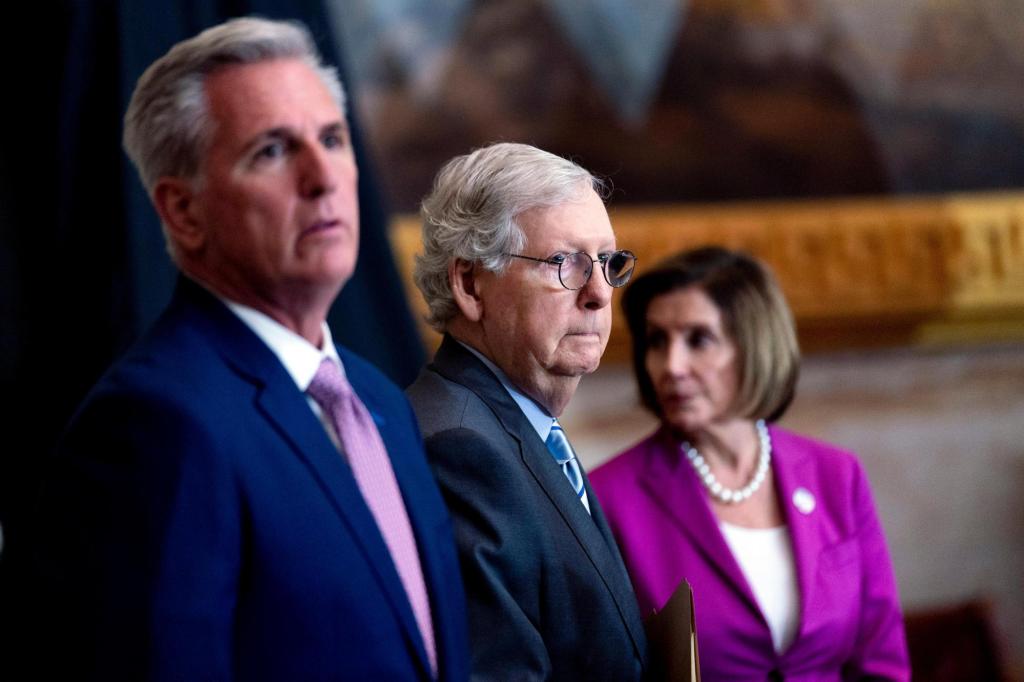Blood
A Progressive Perspective: Term Limits — The best way to Infuse New Blood in Government
Recently, Rep. John James (R-Michigan), a freshman House Republican has stirred up a perennial debate in American politics by calling on Congress to give serious thought to imposing an age limit for federal elected officials. Republican Presidential candidate Nikki Haley added fuel to the fire by calling for term limits after witnessing Mitch McConnell’s most recent freeze and called for a mental competency test for those over 75 years of age.
Enacting a Constitutional amendment regarding age or term limits would be a years-long process and would have to be approved by two-thirds of the House and Senate or ratified by three-fourths of the state legislatures.
I’ve been thinking a lot lately about how we should be dealing with the age issue in light of the recent health episodes that have surfaced regarding Senate GOP leader Mitch McConnell, (R-Kentucky) and former Senator Dianne Feinstein, (D-California) and the announcement by former House Speaker, Nancy Pelosi, (D-California), who is 83, that she will be running for re-election next year. Pelosi has represented her San Francisco district for 36 years.
The bill that Congressman James has proposed would have lawmakers amend the Constitution and establish an upper age limit for eligibility to be President, Vice President or a member of Congress. If it passed, the law would call on Congress to work on a Constitutional amendment to prevent anyone from running for those offices “if at any time during the term the person will be 75 years of age or older.”
There are currently 18 lawmakers who are at least 80 years old and both candidates for President would 80 during their term of office. Biden is 79 and Trump is 77. Pelosi is just the seventh oldest member of the House.
Our founding fathers sent us mixed messages regarding age limits. Madison liked the idea of electing Senators every seven years and Hamilton wanted both Senators and President to remain in office for life. Then again the life expectancy of average American during colonial times was 35. This would give most citizens just a few months to run for the presidency before they keeled over. They were not thinking about the possibility of living, let alone, serving into ones 80s.
I am approaching my 77 birthday. While I feel my memory and overall physical energy level are down a bit, I feel my overall mental acumen and my basic physical dexterity is still pretty good. I’ve thought about whether I have what it takes to be an effective energetic office holder. I’ve decided after careful consideration, the answer, in my case, is no to Congress, but yes to the Presidency.
I think that needs some explanation. I feel there is much more physical stamina needed to be an effective member of Congress than to serve as President. Serving in Congress entails the back and forth either on train/car/plane from Washington, D.C. to one’s home state for constituency service/meetings and lots of local campaign event. Likewise, there are multiple committee meetings, D.C. events and constant fundraising. That all sounds very daunting and too much for me.
The Presidency, on the other hand, has all of the accruements of the most important and prestigious position in the world. No schlepping whatsoever, no worries about housing or meals, White House staff and aides at your beck and call, travel via Air Force in your own bed and all other transportation and accommodations at an ultra-premium level. I understand the responsibilities of the office are enormous, but the bennies are also pretty special and the job is much less physically demanding.
I’ve come to the conclusion that term limits, rather than age limits, are a good way of infusing new blood in American politics and addressing the issue of elected officials overstaying their time in power. I’d recommend an 18-year term limit for Congress (nine terms in the House and three in the Senate).
I’ve arrived at this position because there is no specific age at which our faculties decline to the point that our performance in office would be impaired. It varies from individual to individual. Thus, setting an arbitrary age limit makes little sense. The main problem with an aging Congress is not the overall decline in the mental acuity, the problem is entrenchment. Incumbency breeds entrenchment.
Ballotpedia reported that Congressional incumbents, largely because of name recognition and massive fundraising advantage, won 98 percent of their re-election bids; in 41 states, every congressional incumbent running for re-election won.
While term limits for members of Congress is by no means a panacea for all of America’s most serious political problems, I believe it would bring more new ideas and fresh perspectives to Congress and result in representatives who are more reflective of, and more responsive to the needs of their constituents rather than big donors and special interests. Special interests oppose term limits because they do not want to lose their valuable investment in incumbent legislators.
By counterbalancing to some extent incumbent advantages, which inevitably hinder challengers, term limits will produce greater congressional turnover and perhaps most importantly, instill a greater sense of electoral vulnerability among members of Congress.
Irwin Stoolmacher is president of the Stoolmacher Consulting Group, a fundraising and strategic planning firm that works with nonprofit agencies that serve the truly needy among us.

